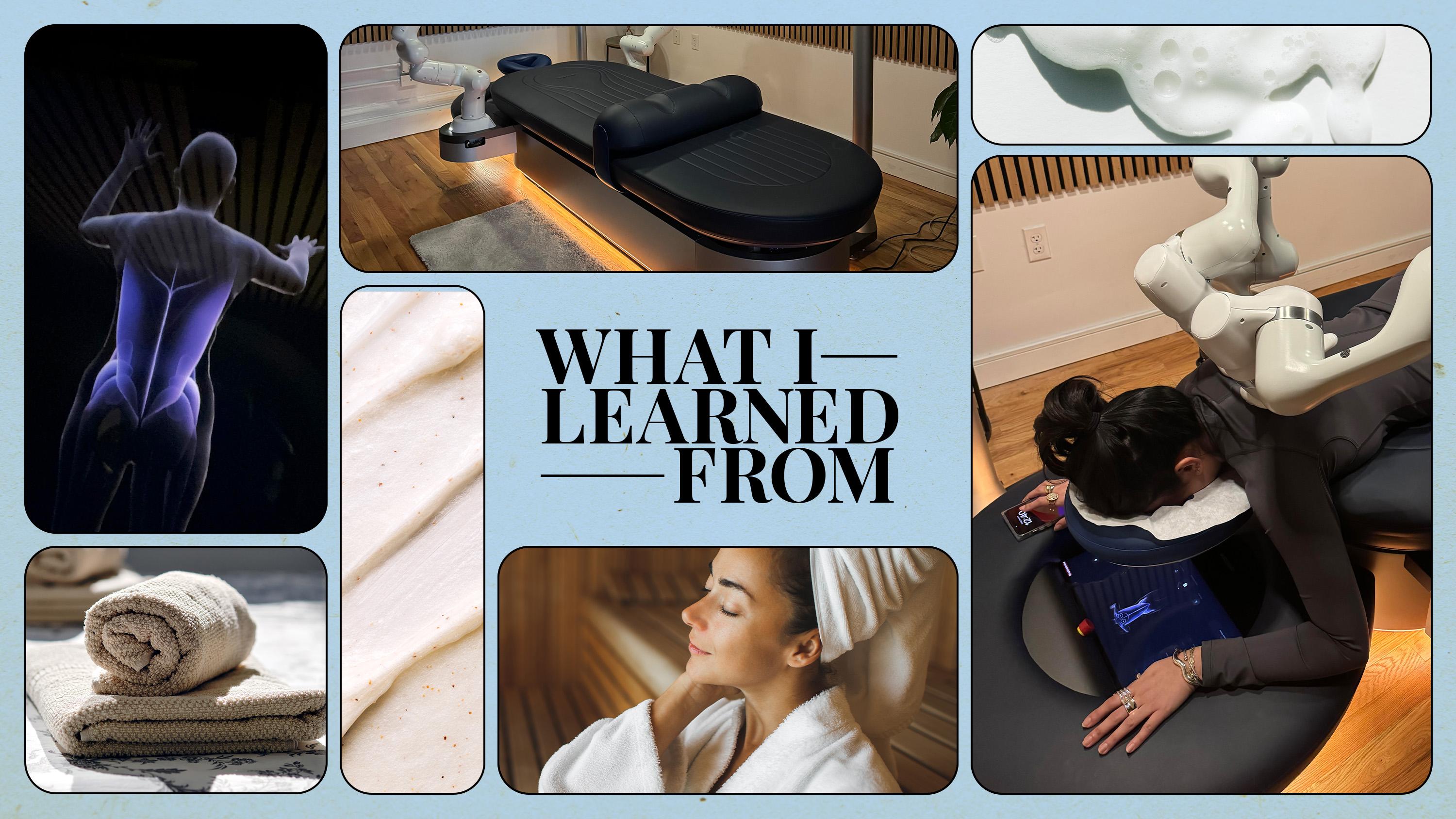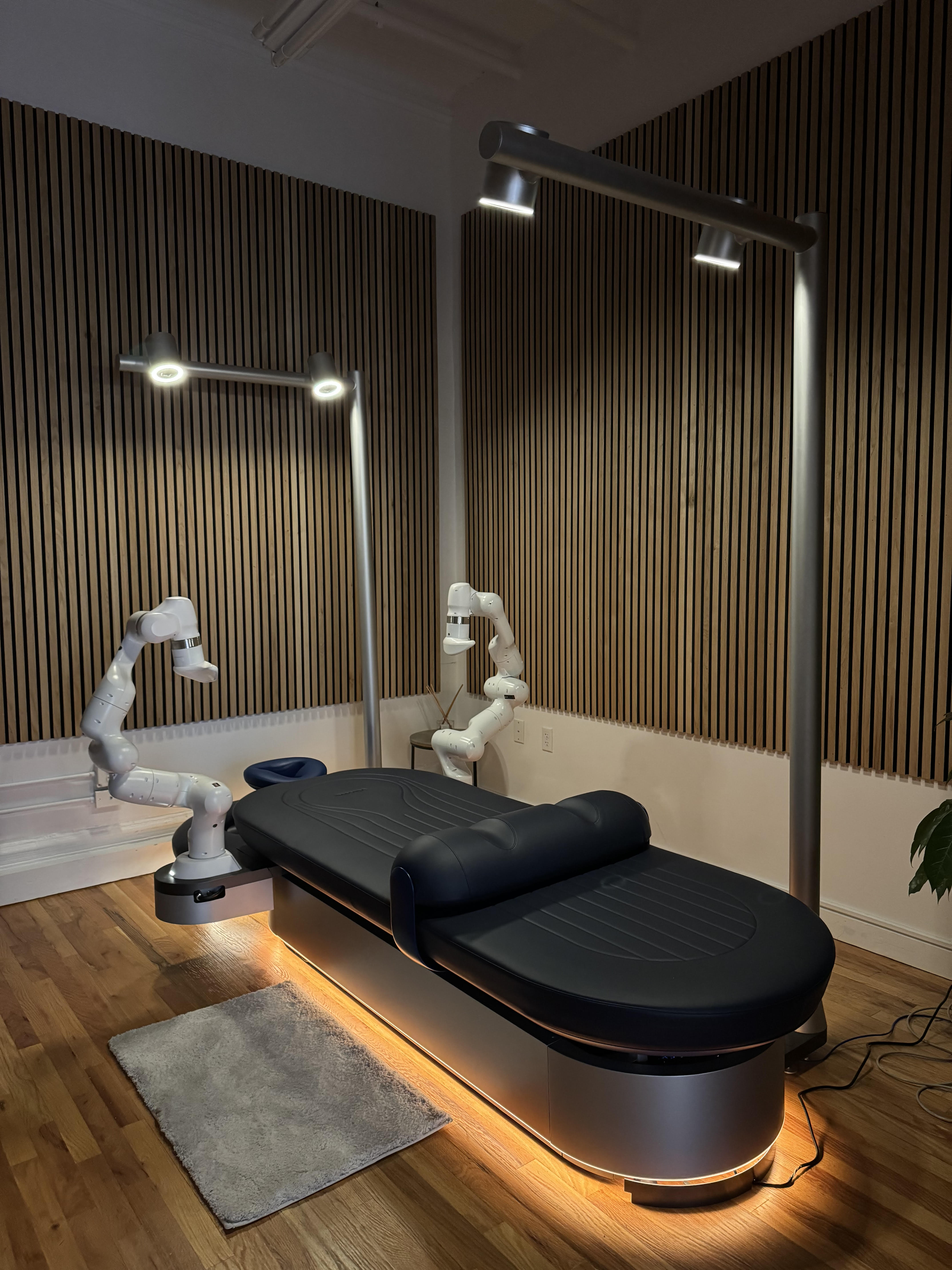I Can Confirm Getting an AI Robot Massage Is the Perfect Treatment for Introverts
Enjoy self-care without the unnecessary banter.


Welcome to What I Learned, Maire Claire’s monthly report on the most transformative treatments, devices, and innovations in aesthetics. Here, our editors candidly share their biggest takeaways post-procedure.
There is nothing as delightful as a relaxing massage. Calming essential oils! Skin-softening lotions! Human touch! However, the challenge with these treatments, especially in a bustling city like New York, is that it’s nearly impossible to secure an appointment with your favorite masseuse. You must book far in advance, which can be frustrating, especially when your schedule is inconsistent. There's also no middle ground between seedy reflexology studios (No shade! Some are great) and upscale spas that charge an arm and a leg to massage your arms and legs. And more importantly, I'm forced to speak with my massage therapist. Most places allow me to decide my communication preference before enjoying the experience, but for me, even engaging in small talk before, during, and after is exasperating. That is until I stumbled upon the robot massage.
New York-based lifestyle robotics company Aescape (pronounced escape) teamed with Equinox to unveil an AI-driven massage table that meticulously scans a user’s body, capturing over 1.1 million 3D data points. This data enables the table to accurately map the user’s body position and pinpoint key anatomical points for precise, targeted massage therapy. Currently, the treatment is offered at various locations across New York City (including the Lotte New York Palace Hotel) with plans to roll out nationwide later this month—no membership required.
Before you panic and embark on a “robots are taking over” campaign (which I almost did myself), it’s important to understand the nuances of this treatment and the gap in the market it fills rather than viewing it as a threat to traditional masseuses’ market share. This type of massage doesn't have the frills—no aromatherapy or fancy oils and serums. Instead, you receive an intuitive dry massage experience that you control entirely. Through a user-controlled dashboard, you can create a precise, targeted massage that fits your needs.
Curiosity got the best of me, so I decided to become a human guinea pig and booked a demo at the New York Aescape office. Everything I learned from the treatment—including having my knots rolled out by robotic arms—ahead.

The fully automated, artificial intelligence-driven massage table.
The Treatment, Explained
Upon arrival, I changed into the provided apparel that minimizes friction like body oil does (similar to a wet suit) and settled onto the table. l immediately noticed a huge touchscreen embedded in the headrest, which allowed me to control the entire experience. I had complete power over the massage experience, including target areas, lighting, music preferences, and pressure points—no more needing to ask my practitioner to tone down their Hulk-like force. From there, I selected a highly customized range of massage experiences tailored to my body profile. I was brave—I went with a full body treatment. I must admit, I was also a little freaked out.
Overhead depth sensors meticulously scanned my body, capturing every detail to generate a precise 3D model. This model was then displayed on the touchscreen, serving as a comprehensive guide for my session. I was truly impressed by the level of detail and accuracy.
Stay In The Know
Get exclusive access to fashion and beauty trends, hot-off-the-press celebrity news, and more.
The treatment felt very dystopian as I laid in a dimly lit room, waiting for the robot to get to work, with the sound of a waterfall echoing throughout.
The machine had a very non-threatening appearance (more Wall-E than Ultron), so I didn’t fear it would crush my bones; rather, it just felt a bit unnatural. But for those who are scared or tend to wiggle around a lot, there is an automatic safety button I could press if I wanted to stop the session. The table itself was heated and comfortable, and while I missed the sensorial experience of a “real massage,” this new type of massage was just as effective in relieving muscle tension. The full-body experience targeted my upper back, mid-back, and lower back, as well as my hips and glutes. Initially, I wanted the highest pressure, but I adjusted it throughout the massage as I saw fit. Each part of my body had four to six minutes of attention as it acclimated to touch, increased pliability, stretched and elongated, broke up knots, and restored muscle tone. I was in heaven.
Above all the features, my favorite was the ability to remain silent. I’m an extrovert, and I have a hard time speaking up for myself and often wince in pain because I’m too nervous to tell them to tone it down. Thankfully, the dashboard allowed me to adjust the pressure, which I did often—without opening my mouth.
The Benefits
The benefits of this massage table extend to anyone seeking recovery, whether it’s from stress, the rigors of daily life, athletic endeavors, or any other challenges. “You always know what you’re going to get, and it’s going to be consistent,” says Eric Litman, Founder and CEO of Aescape.
Another benefit is its availability on demand, unlike traditional massages where you may have to wait weeks to find a person who connects with you and understands your body. You can even indulge in a session every day.
Furthermore, it’s a shorter time commitment for those who are always “too busy.” According to Litman, “you get 60 minutes worth of treatment in a 30-minute session at a price point we think people can incorporate into their everyday life.”
Moreover, you have the autonomy to determine what you get out of your treatment—where you want it, how firm you want it to be, and even the choice of music, environment, and overall experience without worrying about coming off as entitled or high-maintenance. Future plans for the company involve offering post-treatment insights about what it has learned about your body, providing suggestions and recommendations for future sessions, such as improving posture during the day. This will enable you to have a “more data-driven relationship with your body, including details on the work you’ve done with us, and how that work impacts key aspects of your health and life,” says Litman.
Additionally, you don’t have to interact with anyone if you’re uncomfortable with human touch or simply want some time to yourself.

The touchscreen near the massage table alerts you when your treatment is complete.
The Cost
The base price at the Equinox in New York is $60 for 30 minutes and includes a free day pass to non-Equinox members. Future locations may vary in pricing, potentially offering additional features and amenities. The next iteration is to offer extras like a cold plunge, sauna, and hot tubs, with these options demanding higher fees.
The Aftercare
The beauty about the AI powered massage is that a post-massage shower isn't necessary. You aren't rubbed down with fragrant oils or lubricants, and there's minimal sweat, so you can immediately leave the spa without bathing.
Another plus, is that in the days afterwards, I experienced zero soreness and no bruising, which unfortunately is often experienced with a traditional massage. While I love the customization and a quiet room, I still have a soft spot for personal touch. Moving forward I plan to engage in traditional massages (I am a sucker for spa amenities), but when my extroverted ways get the best of me, a robot massage will be a worthy alternative.

Iman Balagam is a New York-based freelance writer with several years of experience covering the beauty industry. Balagam's writing has been featured in editorial outlets like Cosmopolitan, Teen Vogue, Byrdie, and Harper's Bazaar.
-
 I've Used Airbnb for 10 Years—These Design-Focused Homes Are My All-Time Favorites
I've Used Airbnb for 10 Years—These Design-Focused Homes Are My All-Time FavoritesStylish sanctuaries you'll never regret visiting.
By Lydia Swinscoe Published
-
 'Million Dollar Secret' Winner Cara Kies Gave a Masterclass in Reality TV Gameplay
'Million Dollar Secret' Winner Cara Kies Gave a Masterclass in Reality TV GameplayHere's what to know about the In-N-Out line cook who took home the prize pot.
By Quinci LeGardye Published
-
 James Middleton Says He "Had 3 Mothers Growing Up" Thanks to Sisters Kate and Pippa
James Middleton Says He "Had 3 Mothers Growing Up" Thanks to Sisters Kate and Pippa"I'm now in my late 30s and we still have that friendship."
By Kristin Contino Published
